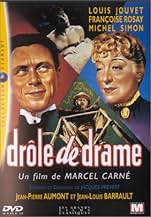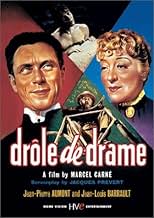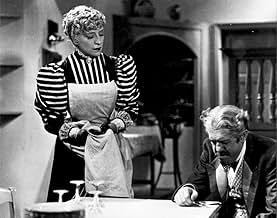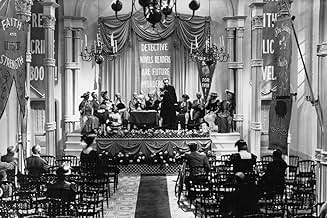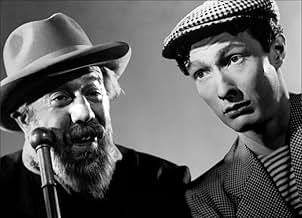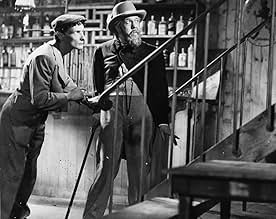Drôle de drame
- 1937
- Tous publics
- 1h 34min
A Londres pendant la période victorienne, un écrivain de romans policiers et sa femme simulent leur disparition afin de se cacher d'un évêque anglican qui mène une campagne contre les «maux»... Tout lireA Londres pendant la période victorienne, un écrivain de romans policiers et sa femme simulent leur disparition afin de se cacher d'un évêque anglican qui mène une campagne contre les «maux» de la fiction policière.A Londres pendant la période victorienne, un écrivain de romans policiers et sa femme simulent leur disparition afin de se cacher d'un évêque anglican qui mène une campagne contre les «maux» de la fiction policière.
- Réalisation
- Scénario
- Casting principal
- Mrs. McPhearson
- (as Jeanne Lory)
- Le balayeur
- (as Génin)
- L'inspecteur-chef Bray
- (as Alcover)
Avis à la une
The film, directed by Marcel Carné and written by Jacques Prévert, is perhaps the only case of screwball French comedy I could recall, and I'm not surprised that it was adapted from a British novel ("His First Offense" by Joseph Storer Clouston), as there's something of British acerbic wit and sly humor that confined to dark comedy in this amusing, although somewhat confusing little gem. But let's be frank, the film isn't as celebrated as other cinematic involvements from Carné, Prévert or Jouvet, French audience might not be familiar with the title of this film but they'd certainly know what we're talking about if we just utter the words "bizarre, bizarre ", one iconic scene is the reason why this film is famous today, it has on a French ear the same resonance than "On The Waterfront" monologue or Travis Bickle's mirror scene.
It's called the 'Bizarre' scene, just utter to a French person or a French movie lover "Bizarre Bizarre " and he'll immediately retort "Did I say Bizarre? How strange?" or "How Bizarre" there are many variants but the point is that this film has immediately screwed itself on Pop-Culture and never deserted it, one simple exchange earned it a ticket to posterity, which was pretty common in these days. Indeed, since the rise of the talkies, no French film could become a real classic without "THE" line to immortalize it. Circa 1937-1938, many movies provided some of the most classic quotes of French cinema, "Port of Shadows" with Jean Gabin telling Michèle Morgan how beautiful her eyes were and in "Hotel du Nord" were Arletty delivered her iconic 'atmosphere' rant, both films were directed by Carné but there are many other great quotes from the same era.
The scene is simple and efficient even when taken out of context, but it works exquisitely better when you know the context. Louis Jouvet is an Anglican Bishop named Soper, he leads a campaign against "unholy" crime fiction writers and had just went into a vehement tirade against an unknown pulp fiction writer named Félix Chopel. Unbeknownst to him (and to the general public), the mysterious Chopel happens to be his cousin, the meek and timid botanist Irwin Molyneux, whose affable nature, awkward tics and mannerisms and teddy-bear like appearance contrast with Jouvet eagle-like sharpened eyes and inquisitive tone. His conference is interrupted by local criminal named Williams Kramps (Jean-Louis Barrault) and known as the butcher-killer (Jean-Louis Barrault), he swears to kill Chopel who inspired his much regretted vocation, Molyneux realizes he might blow his cover by acting too scared, but he is, really.
It gets tricky when Soper literally invites himself to his cousin's house and even trickier when the house has just been emptied of the servants tired of the boring routine, and suddenly only inhabited by Chopel's wife Margaret (Françoise Rosay) and his secretary, Eva (Nadine Vogel), who's enamored with a young and handsome milkman named Billy (Jean-Pierre Aumont) whose real talent is to tell stories. We'll later learn that he's the one who give the ideas to Chopel aka Molyneux with Eva as an intermediary. So there are as many secrets, lies and false identities as seeds planted to grow more confusingly comical situations, and finally blossoming in pure comical hilarity where everything gets even more messier for the sake of laughs, but since nothing really tops the iconic "bizarre" moment so let's get back to that scene.
Chopel doesn't want to show his cousin that they're too poor not to afford servants (there's also a heritage subplot in the film), he pretends his wife is absent, but Soper suspects a disappearance, and everything his cousin said leads to a laconic 'bizarre', It all leads to this situation where a pathetic Michel Simon tries to evade the issue, to "drown the fish", like a French idiom says, but it gets fishier for his cousin who doesn't buy his lies and can tell he's hiding something. He says 'bizarre' in a way that became a staple of suspicion where you know something is strange and can't really put your finger in. It's all in the way the line is delivered a mix of sadness and lucidity, it's just floating in the air like a mood setter, and we know this is only the start of something that will escalate and it does although the film's blurry look and the profusion of characters make it rather hard to get at a first viewing, a second one would be recommended.
Still, like I said, the film peaks with the 'bizarre' moment, there's something so complementary between the two men's acting that it's unfortunate they didn't share more scenes, I read they didn't get along well, but whatever was the reason, I wish the film would have stuck to the spirit of that single scene, it could have been one of these one-location masterpieces à la "Sleuth" and leading to the same finale without the need of romantic subplots, a little less could have been a lot more. I can watch the "Bizarre" scene over and over again, I can tell the same exactly about the film, that the highlight came so early is rather unfortunate and of course, bizarre.
The film is the adaptation of a novel by the British writer J. Storer Clouston, the adaptation being signed by Carné and the eminent poet Jacques Prévert, screenwriter or co-screenwriter of numerous famous French films. The story takes place in London, but it is more of a French version of London, or rather as it would have been represented on a French comedy stage in the first half of the 20th century. We are dealing with serial murders and not very competent detectives from Scotland Yard who solve cases in their sleep, with a Puritan minister and a mysterious crime novelist, with enigmatic disappearances and double identities, with journalists thirsty for sensational news and a milkman in love. The most improbable events follow each other at a rapid pace. Police intrigue and theatrical vaudeville meet in an original mix.
The cast is stellar. Michel Simon appears in a double role alongside Louis Jouvet. The two actors, who were among the superstars of interwar French cinema, did not really get on with each other, but perhaps it was the tension between them that contributed to the quality of some scenes that have become anthological. We can also watch Jean-Louis Barrault, who would become one of the great actors and directors of the French theatre and who was then only 27 years old and dedicated most of his artistic efforts to film, with 5 films in his filmography in each of the years 1936, 1937, 1938. Here he has a secondary, but important and not at all simple, role - a serial killer who also falls in love. Every scene in which he appears is a delight. Satirical arrows at British morals and social formalisms abound. 'Drôle de drame' was and is superb comic entertainment.
"Drôle de Drame ou L'Étrange Aventure de Docteur Molyneux" is a hilarious theatrical comedy of farce and mistakes. Most of the characters are hypocrite, greedy, lazy or simply incompetent and the situations they get involved are silly, naive but very funny. In spite of having irrelevant flaws in the plot, this film is a great entertainment. My vote is eight.
Title (Brazil): "Família Exótica" ("Exotic Family")
Set in Edwardian England, Archibald Soper is a lecherous, hypocritical, poker-faced bishop who holds sparsely attended public meetings denouncing the evils of detective fiction, apparently an English 'craze' of the time. His cousin, Irwin Molyneaux, is a timid gardener married to a splendidly imperious snob, Margaret. He writes, unknown to his family, hugely successful detective novels under the pseudonym Felix Chapel, with plots pilfered from his maid's hyperactive milkman admirer, Billy.
One day, Soper forces himself on the Molyneaux for dinner, but Margaret has exasperated her cooking staff too far, and they have vamoosed. Aghast at the potential humiliation of having no servants, she pretends to be visiting friends and cooks the meal herself. However, Irwin's ineptness at deceit leads Soper to report a murder to Scotland Yard.
The film's starting point is the English fondness for detective fiction, and much of the film's humour, its sense of the absurd, its command of farce, its playing with appearance and class, gives the film an English comic eccentricity, rarely found in the French cinema. DROLE, however, is the complete opposite of the typical English detective novel, which offers an opening chaos and enigma, with the social disruption of a crime and a series of wildly disparate clues and leads, but achieves order and social restoration through the figure of the detective who can see, interpret and control everything.
In DROLE, following Chesterton, say, rather than Conan Doyle, events start in relative order - characters are firmly set in their social positions. But as the plot proceeds, as characters are revealed to be leading double lives, as the profusion of secondary characters complicates rather than explicates the story, as events become more preposterous and unlikely, the social divisions represented by clear-cut spaces are blurred, and the film
escalates into chaos represented by the mob, that great terror of the English, spilling into the narrative, destroying the respectable middle-class home, flouting and mocking the law, making its own judgements. The resolution, such as it is, is a complete lie, because there is no crime, and yet it is brilliantly subversive because it completely disrupts the duplicitous order at the beginning, it alienates people living convenient compartmentalised lives from themselves, forcing them to confront, if only for a moment, their true desires, which contradict their public faces,
DROLE is ridiculously funny, and Prevert's arch theatricality has never been used to greater effect. Another plus is one of the most remarkable casts ever assembled - Michel Simon is immensely touching as the bemused gardener forced to abandon the comforts of his mimosa for the chaos of life on the run (private property being the conservative definition of self); Francoise Rosay is incomparable as the grande dame, besotted by social propriety, yet seething with untapped lust; the young Jean-Louis Barrault is a little callow compared to his seasoned elders, but endearingly impudent - the scene in the greenhouse pond with Rosay is a mock-classical treasure.
Standing out, though, is possibly the greatest French actor of the 1930s, Louis Jouvet, the funniest straight man in the film, keeping his gloriously calm poker-face through all kinds of humiliations and revelations, including the donning of an elaborate kilt to find an incriminating picture from an 'actress'. Best of all is Carne's style, completely unrestrained, unafraid to go for 'gag'-like effects (the mugging of dandies for buttonholes is particularly piquant), beavering through fairy-tale sets that do for London what TOP HAT did for Venice, completely at ease with the farce, yet still pulling off evocative shots that reveal the emotional reality behind the nonsense.
Le saviez-vous
- AnecdotesShot in 23 days.
- Citations
The Bishop: Moi j'ai dit bizarre, bizarre ? Comme c'est étrange... Pourquoi aurais-je dit bizarre, bizarre ?
Molyneux (Michel Simon): Je vous assure, cher cousin, que vous avez dit bizarre, bizarre.
The Bishop: Moi j'ai dit bizarre ? Comme c'est bizarre...
- ConnexionsFeatured in Fejezetek a film történetéböl: A francia lírai realizmus (1989)
- Bandes originalesComplainte de l'Ignoble Molyneux
Music by Maurice Jaubert
Lyrics by Jacques Prévert
Performed by Agnès Capri
Meilleurs choix
- How long is Bizarre, Bizarre?Alimenté par Alexa
Détails
- Durée1 heure 34 minutes
- Couleur
- Rapport de forme
- 1.37 : 1
Contribuer à cette page


![Regarder Bande-annonce [OV]](https://m.media-amazon.com/images/M/MV5BMWQ3NWI5ZmYtNDg1NC00OWI5LWFmYTMtY2MwZGYzZGMyNTkxXkEyXkFqcGdeQXRyYW5zY29kZS13b3JrZmxvdw@@._V1_QL75_UX500_CR0)
